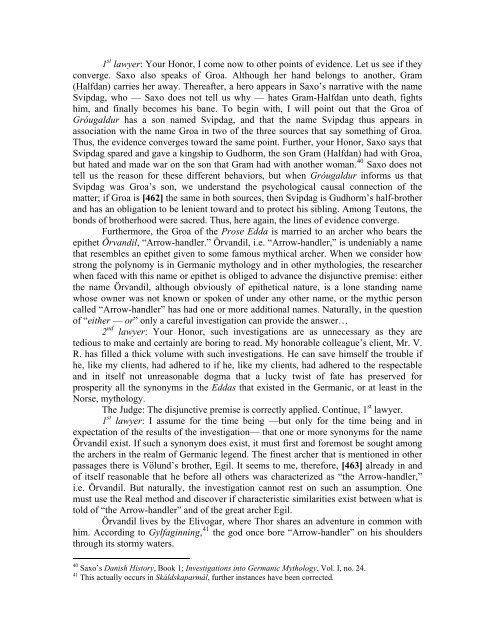Towards a Method of Mythology - Germanic Mythology
Towards a Method of Mythology - Germanic Mythology
Towards a Method of Mythology - Germanic Mythology
Create successful ePaper yourself
Turn your PDF publications into a flip-book with our unique Google optimized e-Paper software.
1 st lawyer: Your Honor, I come now to other points <strong>of</strong> evidence. Let us see if they<br />
converge. Saxo also speaks <strong>of</strong> Groa. Although her hand belongs to another, Gram<br />
(Halfdan) carries her away. Thereafter, a hero appears in Saxo’s narrative with the name<br />
Svipdag, who — Saxo does not tell us why — hates Gram-Halfdan unto death, fights<br />
him, and finally becomes his bane. To begin with, I will point out that the Groa <strong>of</strong><br />
Gróugaldur has a son named Svipdag, and that the name Svipdag thus appears in<br />
association with the name Groa in two <strong>of</strong> the three sources that say something <strong>of</strong> Groa.<br />
Thus, the evidence converges toward the same point. Further, your Honor, Saxo says that<br />
Svipdag spared and gave a kingship to Gudhorm, the son Gram (Halfdan) had with Groa,<br />
but hated and made war on the son that Gram had with another woman. 40 Saxo does not<br />
tell us the reason for these different behaviors, but when Gróugaldur informs us that<br />
Svipdag was Groa’s son, we understand the psychological causal connection <strong>of</strong> the<br />
matter; if Groa is [462] the same in both sources, then Svipdag is Gudhorm’s half-brother<br />
and has an obligation to be lenient toward and to protect his sibling. Among Teutons, the<br />
bonds <strong>of</strong> brotherhood were sacred. Thus, here again, the lines <strong>of</strong> evidence converge.<br />
Furthermore, the Groa <strong>of</strong> the Prose Edda is married to an archer who bears the<br />
epithet Örvandil, “Arrow-handler.” Örvandil, i.e. “Arrow-handler,” is undeniably a name<br />
that resembles an epithet given to some famous mythical archer. When we consider how<br />
strong the polynomy is in <strong>Germanic</strong> mythology and in other mythologies, the researcher<br />
when faced with this name or epithet is obliged to advance the disjunctive premise: either<br />
the name Örvandil, although obviously <strong>of</strong> epithetical nature, is a lone standing name<br />
whose owner was not known or spoken <strong>of</strong> under any other name, or the mythic person<br />
called “Arrow-handler” has had one or more additional names. Naturally, in the question<br />
<strong>of</strong> “either — or” only a careful investigation can provide the answer…<br />
2 nd lawyer: Your Honor, such investigations are as unnecessary as they are<br />
tedious to make and certainly are boring to read. My honorable colleague’s client, Mr. V.<br />
R. has filled a thick volume with such investigations. He can save himself the trouble if<br />
he, like my clients, had adhered to if he, like my clients, had adhered to the respectable<br />
and in itself not unreasonable dogma that a lucky twist <strong>of</strong> fate has preserved for<br />
prosperity all the synonyms in the Eddas that existed in the <strong>Germanic</strong>, or at least in the<br />
Norse, mythology.<br />
The Judge: The disjunctive premise is correctly applied. Continue, 1 st lawyer.<br />
1 st lawyer: I assume for the time being —but only for the time being and in<br />
expectation <strong>of</strong> the results <strong>of</strong> the investigation— that one or more synonyms for the name<br />
Örvandil exist. If such a synonym does exist, it must first and foremost be sought among<br />
the archers in the realm <strong>of</strong> <strong>Germanic</strong> legend. The finest archer that is mentioned in other<br />
passages there is Völund’s brother, Egil. It seems to me, therefore, [463] already in and<br />
<strong>of</strong> itself reasonable that he before all others was characterized as “the Arrow-handler,”<br />
i.e. Örvandil. But naturally, the investigation cannot rest on such an assumption. One<br />
must use the Real method and discover if characteristic similarities exist between what is<br />
told <strong>of</strong> “the Arrow-handler” and <strong>of</strong> the great archer Egil.<br />
Örvandil lives by the Elivogar, where Thor shares an adventure in common with<br />
him. According to Gylfaginning, 41 the god once bore “Arrow-handler” on his shoulders<br />
through its stormy waters.<br />
40 Saxo’s Danish History, Book 1; Investigations into <strong>Germanic</strong> <strong>Mythology</strong>, Vol. I, no. 24.<br />
41 This actually occurs in Skáldskaparmál, further instances have been corrected.
















